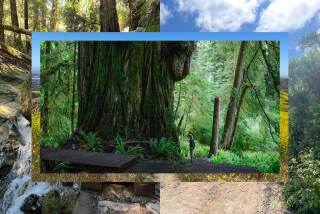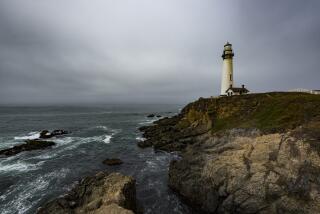A Ghost Town of Dreams
- Share via
ALLENSWORTH, Calif. — As I drove north toward Tulare County, I didn’t know much about Lt. Col. Allen Allensworth and his attempt to establish a black township here in the early 1900s.
Allensworth, once the highest-ranking black officer in Army history, died in 1914, and his community subsequently withered. But as my sister, Linda, and I found out during our trip here last month, his legacy lives on in the hopes of settlers commemorated at Colonel Allensworth State Historic Park, about five miles northwest of Delano and an hour’s drive north of Bakersfield.
Our visit coincided with Founder’s Day at the park, marking the day Allensworth created a town where pioneering African Americans aimed to escape discrimination and thrive in self-governing independence. Allensworth lives on as a ghost town, its nine buildings spread across 240 acres of an otherwise empty plain. But it wasn’t always this way.
At its height, 250 people lived and worked in a town comprising nearly 60 structures, including a public library, church, school and general store. The community also had a glee club, a brass band and a ladies’ improvement society. It was a success, especially measured against its humble roots.
Allen Allensworth, the youngest of 13 children, was born into slavery in 1842 in Louisville, Ky. In the biography “Out of Darkness” (Inkling Press, 1995), author Evelyn Radcliffe details the horrors endured by Allensworth, one battered strand in slavery’s tapestry of pain. He was sold and separated from his family at age 12, but not before his mother, Phyllis, instilled in him a vision of what he could become: not a slave but an educated, cultured, influential man.
Allensworth followed that dream, becoming a chaplain in the U.S. Army by 1884, an unprecedented position for an African American at the time. He retired in 1906 and two years later moved to a tract of land in California he acquired with supporters. Many black townships were being set up across the country, but only Allensworth’s was not a government-sponsored enterprise.
The group publicized itself simply as a new agrarian community for people of color, but according to historian Ed Pope, whom we met on Founder’s Day, Allensworth planned something far more ambitious. Influenced by the achievements of his friend Booker T. Washington, he envisioned a town with a polytechnic college, railroad access, grain warehouses and a broad economic base.
All that was not to be. The company from which Allensworth acquired the land reneged on the water rights and allowed a stream to be dammed, cutting off the community’s water supply. A competing grain warehouse and railroad spur were built in nearby Alpaugh, and trains bypassed Allensworth altogether.
On a 1914 trip to Los Angeles to plead for state support of his college, Allensworth died when he stepped off a curb in Monrovia and was struck by a motorcycle. Police ruled it an accident; newspapers speculated suicide. Pope, who has reviewed autopsy records, insists it was murder.
Without Allensworth and without water, residents disbanded and buildings fell into disrepair. In the 1960s a developer wanted to buy the site, tear down the remaining structures and build a resort. Descendants of the original Allensworth residents fought the plan. After nearly eight years of lobbying, they got the land designated a state historic park in 1976.
Today, Allensworth’s appeal is not in its buildings, as interesting as they may be. The treasures are people like Pope, who showed us the old schoolhouse and displayed part of his extensive collection on the town’s history, and Alice Royal, whose family presided over the drugstore. The first school in Allensworth was established in her family’s home.
Because of limited funding, park buildings are usually closed except for special events such as Founder’s Day. The next event is Oct. 13, when the 25th annual rededication ceremony will be held from 10 a.m. to 4 p.m. Visitors can tour the buildings, attend lectures and hear gospel choirs and others perform. A campfire program will be held the evening before at 7.
During our visit, Linda and I were moved by photographs, scrapbooks and other memorabilia that Royal had collected. They showed that the former slaves who founded the town were just what Allensworth’s mother had hoped they could become: educated, self-sufficient, influential.
“The history books won’t let us out of slavery,” Royal said. “The story of black Americans seems to focus solely on that aspect of our history. But we were soldiers, doctors, musicians, nurses, politicians, judges, writers too. That’s the story of Allensworth, and that’s what the town is all about.”
Linda and I arrived in the Central Valley a couple of days before our visit to Allensworth and checked into the Rio Bravo Resort on the Kern River, 10 miles north of Bakersfield.
Sliding glass doors in our room ($68 per night, plus tax) opened onto a small lake fringed with weeping willow and populated by ducks. Another perk was the swimming pool, steps away. That evening from our room, we watched sunset, the sky striped like the edge of a Mexican serape beyond bare, camel-colored hills.
The Rio Bravo offers a reduced rate for guests who take a rafting trip with Kern River Tours. Neither Linda nor I had been rafting, and although it took some persuasion, I talked her into it.
The Kern River’s swift currents can be treacherous, and warning signs often go unheeded; each year, unsuspecting swimmers drown. But the rafting company assured me that its half-day tour runs along four miles of safe water.
The trip departed from the resort at 10 the next morning with three rafts, 14 rafters and three guides. We drove 15 minutes in a converted school bus to the launch point. For a dangerous river, the Kern looks deceptively calm. The lead guide lectured us about rip currents and hidden boulders, and all of us suited up in life vests.
Our guides were local students, and two of the three took their jobs seriously. The youngest, only 16, didn’t seem up to the task of leading a raft of junior high school girls.
We set off nonetheless, paddling, spinning and bouncing through Class III rapids, which were pretty exciting for us novices. (Rapids are ranked from Class I, meaning small waves and open passages, to Class VI, which are too treacherous for commercial tours.)
The river ran past rugged canyon walls interspersed with sudden plateaus, where lawns ran from the water’s edge up to lavish houses. When we reached the calmest part of the run, everyone jumped into the river and assumed the lounge-chair position--face up, legs out--for a ride down a stretch of sandy shallows.
A bus took us back to the resort for lunch. Then we returned to the launch site and did it all again. Linda, who had been less than enthusiastic about the excursion, had to be dragged away at the end.
We were ravenous after a day on the water. One of the guides told us of a popular Basque place called the Wool Growers Restaurant in east Bakersfield. The place was across the street from a burned-out thrift shop, but inside, it was a happening hangout for locals.
The food was a parade of curiosities. Cabbage soup, red salsa and kidney beans came first, followed by a plate of pickled tongue, lettuce and tomato. Our entrees of filet mignon were good, but they were complemented by sides of spaghetti, corn and French fries. “But I don’t understand,” my sister kept muttering as one eclectic dish after another slid onto the table. She looked at me in wonder when dessert appeared in front of us; it was called spumoni on the menu, but the whole thing was mocha-colored and tasted like pistachio. “I’m lost,” she finally declared.
“No,” the waitress said. “You’re in Bakersfield.”
(BEGIN TEXT OF INFOBOX / INFOGRAPHIC)
Budget for Two
Rio Bravo Resort, two nights--$152.32
River rafting--132.00
Dinner, Wool Growers Restaurant--50.31
Breakfast, two days, Rio Bravo--33.16
Other meal--23.81
Gas--20.00
FINAL TAB$411.60
* Rio Bravo Resort, 11200 Lake Ming Road, Bakersfield, CA 93306; telephone (888) 517-5500 or (661) 872-5000, fax (661) 872-6546, Internet https://www.riobravoresort.com.
* Allensworth State Historic Park, Star Route 1, Box 148, Allensworth, CA 93219; tel. (661) 849-3433 or (661) 248-6692, https://www.parks.ca.gov/default.asp?page_id=583.
More to Read
Sign up for Essential California
The most important California stories and recommendations in your inbox every morning.
You may occasionally receive promotional content from the Los Angeles Times.










